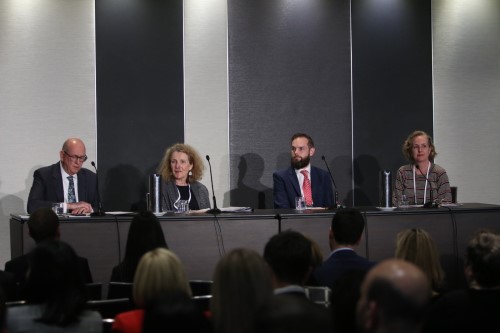This article follows a session on this topic held at the ASIC Annual Forum (AAF), 3-4 November 2022. Catch up on session highlights from the Forum.
The session was moderated by David McGuinness, Senior Executive Leader, Financial Services Enforcement, ASIC.
Panel:
- Delia Rickard, Deputy Chair, Australian Competition and Consumer Commission
- James Roberts, General Manager, Group Fraud, Commonwealth Bank
- Samantha Yorke, Government Affairs and Public Policy, Google Australia

Key points
- The session explored the characteristics of scams and other illegal investment schemes and the harm they cause.
- ASIC is working with regulators, law enforcement agencies and industry, both domestic and overseas, to disrupt scams and coordinate enforcement strategies.
- We continue to focus on consumer education to help protect Australians from financials scams.
In a volatile market, investors are looking for ways to improve their returns. While higher yields typically come with higher risk, scammers are taking advantage of heightened economic uncertainty and using social media and other technologies to target Australians. The panel discussed how to combat the rise of online scams.
ASIC Senior Executive David McGuiness said, ‘ASIC’s focus is on investment scams and their disruption and deterrence. The harm caused to Australians cannot be tackled by regulators alone.
Mr McGuiness told delegates at the forum ‘ASIC sees you all and the organisations you work for as our corporate allies in tackling scams – you’re part of the ecosystem in which the problem is manifesting and you’re part of the ecosystem that needs to be part of the solutions. The incidence of financial scams can no longer be seen as endemic – it is spreading beyond containment and causing stress to our financial infrastructure, our economy and consumers.’
Taking action to prevent and address scams
ASIC is working with other regulators, law enforcement agencies and industry, both domestic and overseas, to disrupt scams and coordinate enforcement strategies. Together, we are developing data-informed approaches to identify, quantify and disrupt scams.
ASIC is reviewing the banking sector to understand their scam identification and response strategies.
We continue to work with Google to combat financial fraud in advertising, learning from the licensing verification process put in place in the UK, with the Financial Conduct Authority. Google has implemented a policy in Australia to only allow advertisements for financial products or services by licensed businesses.
Alongside this, we are taking enforcement action to deter serious investment scams.
ACCC Deputy Chair Delia Rickard said, ‘There’s never been more work being done to stop scams. And there’s never been more scams. We’re close to $480 million loss so far this year. Investment scams are really where the major problems are.’
Ms Rickard said, ‘The vast majority of scams are still done by phone. Some great work has been done with the telecommunications industry.’ However, she noted scams continue to evolve and now ‘we’ve seen an explosion of scams targeting encrypted apps like Whatsapp.’
Scope and character of scams in Australia
According to the ACCC’s Scamwatch, Australians lost a record amount of more than $2 billion to scams in 2021.
Australians remain vulnerable to investment scams, the highest loss category, losing more than $242 million to investment scams in the first half of 2022.
A diverse range of technologies are enabling scams. In 2021, bank transfers were the most common payment method for scams, with $129 million in losses reported to Scamwatch. There were also 4,730 reports of crypto investment scams to Scamwatch, with $99 million in reported losses.
Of particular concern are newer types of scams, such as money recovery scams, which target previous scam victims.
Cyber breaches and identity theft
Recent cyber breaches have heightened awareness of cyber security risk and the potential for identity theft. A key priority for ASIC is to strengthen cyber resilience and market integrity.
We continue to focus on our communications and consumer education, including through social media, to help consumers to protect themselves from scams and know how to identify them.
For more information about scams, visit ASIC’s Moneysmart website. This includes tips on how to check an investment is real and what to do if you’ve been scammed.
ASIC is Australia’s corporate, markets and financial services regulator.